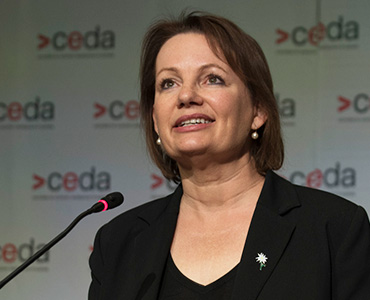Explore our Climate and Energy Hub
10/10/2016
 At State of the Nation Ms Ley outlined the immediate and future challenges the health system faces, including: remote communities, an ageing population and health expenditure growing faster than the economy.
At State of the Nation Ms Ley outlined the immediate and future challenges the health system faces, including: remote communities, an ageing population and health expenditure growing faster than the economy.
“Our population is ageing rapidly. By 2036 almost 20 per cent of the Australian population will be aged 65 and older. Geographic spread is a challenge, especially in the case of remote communities. Indigenous communities, sometimes in very remote locations, need good health services to meet their needs, and need a high quality workforce,” Ms Ley said.
“Digital technologies are showing promise in breaking down some of these barriers.
“The challenges encourage us to think outside the square. We have to provide the conditions to attract and retain the workforce we need.
“Innovations like My Health Record will become an increasingly important way for Australian patients to share their health information with health care professionals.
“An individual health care record that is electronic, digital and attaches to you, the patient, is one of the key remaining micro-economic reforms in health. We are leading the world in this.”
Ms Ley said that one of the key issues facing the health system was its sustainability.
“I hear my political opponents diminish the argument a bit by saying ‘Well, sustainability doesn’t mean anything because if you’re prepared to pay something is sustainable.’ But my favourite saying in health is, ‘If you can’t pay for it, you can’t deliver it’, so of course we are constrained by the fiscal circumstances we find ourselves in,” she said.
“Having said that, I don’t see that as doom and gloom because I think you make the most efficient system when you have, in a pure economic sense, an allocation of scarce resources.
“So I don’t dream of a world where there is unlimited money because we wouldn’t actually build the best system if we had unlimited funds – 30 per cent of expenditure inside health, according to an expert who spoke to the South Australian Government recently, is waste inside the health system.
“We all know that we can do better with the health dollar.”
Ms Ley said that over the past 25 years, Australia’s total health expenditure has increased from 6.5 per cent of GDP, with latest figures from the Australia Institute of Health and Welfare showing it reached 10 per cent of GDP in 2014–15.
“While the rate of growth has slowed, it is still growing faster than the economy. In the longer term, this trend is not sustainable. This is driving our reform agenda – we need to find ways to work smarter with limited resources, and ensure our health system is robust, high performing, but flexible enough to meet future challenges.”
